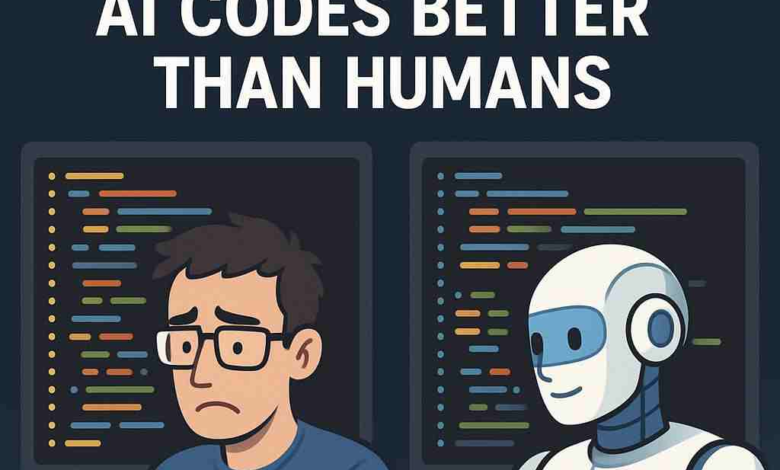How Game Developers Can Stay Employed When AI Codes Better Than Humans

Today, artificial intelligence (AI) is getting better at coding, and this is changing game development. AI can create complex code on its own, which brings both challenges and opportunities for game developers. This article explores how game developers can keep their jobs as technology changes. They can do this by focusing on their creative skills, storytelling, and new technologies such as blockchain and virtual reality (VR) gaming.
The Rise of AI in Game Development
AI’s encroachment into coding tasks is reshaping the gaming industry. With AI algorithms capable of writing code at speeds and precision levels unattainable by humans, the question arises: where does this leave human developers?
The Role of AI in Coding
AI’s coding capabilities are not just limited to basic tasks; they extend to complex problem-solving and optimization processes. AI can rapidly prototype game mechanics, balance in-game economics, and even create adaptive difficulty settings based on player behavior. This automation allows developers to bypass time-consuming coding tasks, enabling them to focus on more creative aspects of game development.
Moreover, AI-driven tools are increasingly being integrated into game engines, allowing for real-time adjustments and improvements. These tools can identify bugs, suggest enhancements, and even predict player reactions to certain gameplay elements. As AI continues to evolve, its role in the coding process will likely expand, further reducing the time developers spend on routine tasks.
Despite AI’s growing capabilities, it is important to recognize that it still requires human oversight. Developers must ensure that AI-generated code aligns with the creative vision and technical requirements of the game. This oversight role is crucial, as it maintains the quality and integrity of the final product while leveraging the efficiency gains provided by AI.
Implications for Game Developers
The advent of AI coding does not spell the end for game developers; rather, it necessitates a shift in focus. Developers must leverage their unique human abilities—creativity, empathy, and intuition—to remain indispensable. These attributes are paramount in crafting captivating narratives and engaging gameplay experiences that transcend algorithmic creation.
Additionally, AI can take care of technical tasks, allowing developers to explore more creative ideas. This change inspires them to try new game mechanics, unique storytelling, and different art styles. By using these chances, developers can make their games stand out from AI-made content and connect better with players emotionally.
Also, the growth of AI in game development gives developers a chance to work with AI experts and data scientists. This teamwork can create new jobs where developers use AI tools to improve their creative work. By knowing what AI can and cannot do, developers can include these technologies in their processes, leading to more creative and interesting games.
Embracing Creativity and Narrative Development
AI may excel at coding, but it lacks the intrinsic creative spark that defines groundbreaking games. Human developers bring to the table a deep understanding of storytelling, character development, and emotional engagement—elements that are crucial to the gaming experience.
Crafting Immersive Narratives
The narrative aspect of games is where human developers can truly shine. While AI can generate plot points and dialogue, it is the human touch that imbues stories with depth and relatability. Developers must hone their skills in creating rich, multifaceted storylines that resonate with players on a personal level, ensuring that games remain not only entertaining but also impactful.
Creating an engaging story means understanding the cultural and emotional factors that shape how players see things. Game developers should take inspiration from various sources, like books, movies, and their own life experiences, to build genuine and relatable stories. By combining detailed plots and complex characters, they can craft narratives that grab players’ attention and motivate them to think about deeper themes.
Developers can improve stories in games by adding interactive features. These features let players affect how the story ends. This not only makes the game more engaging but also adds a personal touch that AI-generated stories often miss. By allowing players to influence the storyline, developers can create memorable gaming experiences that stand out from the competition.
Designing Engaging Gameplay
Beyond narratives, developers must also focus on designing gameplay that captivates and challenges players. This involves an intricate understanding of game mechanics, player psychology, and dynamic storytelling. By crafting unique and memorable gaming experiences, developers can ensure their creations stand out in a crowded market.
Developers should experiment with innovative gameplay mechanics that challenge conventional norms. By pushing the boundaries of traditional gaming design, developers can create novel experiences that capture players’ attention and keep them engaged. This can include incorporating elements of surprise, strategic complexity, or unique player interactions.
Understanding player psychology is essential in designing engaging gameplay. Developers must consider factors such as motivation, reward systems, and player progression to create experiences that are both satisfying and challenging. By analyzing player behavior and feedback, developers can fine-tune gameplay mechanics to enhance enjoyment and replayability.
Furthermore, integrating dynamic storytelling elements into gameplay can create a more immersive experience. Developers can use branching narratives, adaptive difficulty levels, and player-driven choices to create a seamless blend of story and gameplay. This approach not only enriches the gaming experience but also allows for greater player agency and involvement in the game world.
Leveraging Emerging Technologies
The rapid evolution of technology presents numerous opportunities for game developers to redefine their roles and expand their skill sets. Embracing emerging technologies like blockchain and virtual reality (VR) can open new avenues for innovation and employment.
Blockchain in Game Development
Blockchain technology offers a new way to create games, particularly for in-game economies and digital assets. It helps developers make secure and decentralized platforms, which can boost player trust and involvement. Additionally, blockchain enables the creation of unique and tradable in-game items, encouraging more player interaction and investment. As these technologies evolve, blockchain marketing becomes essential in educating gamers and investors alike about the benefits of decentralized systems. Platforms like Blokpoint play a key role in bridging the gap between game developers and their audiences, offering tools and strategies tailored for blockchain-based engagement and growth.
Developers can use blockchain in game development to create transparent and fair in-game economies, where players have true ownership of their digital assets. This approach can lead to more engaging and sustainable gaming ecosystems, where players can trade, sell, or collect assets with real-world value. Additionally, blockchain’s decentralized nature ensures that player data and transactions are secure, enhancing trust between developers and players.
Blockchain game development also opens up possibilities for new gameplay mechanics and business models. Developers can create games that incorporate elements of scarcity, where limited edition items or experiences become highly sought after by players. This can lead to increased player engagement and new revenue streams, as players invest in the uniqueness and rarity of in-game content.
Virtual Reality and Immersive Experiences
The potential of VR gaming development is immense, offering developers a platform to create fully immersive experiences that transcend traditional gaming boundaries. By mastering VR technologies, developers can create environments that are not only visually stunning but also provide a deeper sense of presence and interactivity. This opens up new possibilities for storytelling, gameplay mechanics, and player engagement.
VR technology allows developers to create highly immersive worlds where players can experience games in entirely new ways. By leveraging VR’s capabilities, developers can design environments that are not only visually stunning but also offer a heightened sense of presence and interactivity. This can lead to more engaging and memorable gaming experiences, where players feel truly immersed in the game world.
Moreover, VR provides opportunities for innovative storytelling techniques that go beyond traditional narratives. Developers can create interactive stories where players are active participants, shaping the narrative through their actions and decisions. This approach not only enhances player engagement but also allows for more personalized and dynamic storytelling experiences.
In addition, VR’s potential for social interaction opens up new avenues for multiplayer experiences. Developers can create virtual spaces where players can interact with each other in real-time, fostering a sense of community and shared experiences. By embracing VR, developers can create games that bring people together in new and exciting ways, expanding the possibilities of social gaming.
Adapting to the Changing Job Market
As AI continues to evolve, game developers must adapt to remain competitive in the job market. This involves continuous learning, skill enhancement, and exploring new opportunities within the gaming industry.
Focusing on Soft Skills
While technical skills are essential, developers should also cultivate soft skills such as communication, collaboration, and problem-solving. These skills are invaluable in team-based environments and can enhance a developer’s ability to work effectively with AI tools and other emerging technologies.
Effective communication is crucial for developers working in collaborative environments, where clear and concise dialogue can streamline project workflows. By developing strong communication skills, developers can more effectively convey their ideas, insights, and feedback to team members, leading to more cohesive and productive development processes.
Collaboration is another key soft skill that can enhance a developer’s ability to work in diverse teams. As game development becomes increasingly interdisciplinary, developers must work alongside artists, writers, and AI specialists. By fostering a collaborative mindset, developers can contribute to a more harmonious and innovative team dynamic, where diverse perspectives lead to richer and more creative outcomes.
Problem-solving is an essential skill for navigating the challenges and complexities of game development. Developers must be able to identify issues, think critically, and devise effective solutions to overcome obstacles. By honing their problem-solving abilities, developers can adapt to the fast-paced and ever-changing nature of the gaming industry, ensuring their continued relevance and success.
Expanding into New Roles
The integration of AI and other technologies in game development creates new roles and opportunities. Developers can explore positions in AI oversight, ethical gaming design, and player community management. By expanding their skill sets and embracing new roles, developers can ensure their relevance in an evolving industry.
AI oversight roles involve ensuring that AI-generated content aligns with the game’s creative vision and ethical standards. Developers in these roles must understand both technical and creative aspects to guide AI’s contributions effectively. By taking on oversight responsibilities, developers can play a crucial role in maintaining the quality and integrity of AI-enhanced games.
Ethical gaming design is another emerging field where developers can make a significant impact. As games become more complex and integrated with AI, ethical considerations around player data, in-game behavior, and AI influence become paramount. Developers can contribute to creating fair, inclusive, and respectful gaming experiences by incorporating ethical frameworks into their design processes.
Player community management is an area where developers can leverage their understanding of player psychology and behavior. By engaging with player communities, developers can gain valuable insights into player preferences and feedback, leading to more player-centric game designs. Developers can also foster strong player relationships and enhance the overall gaming experience by actively managing and nurturing player communities.
Conclusion: The Human Element in Game Development
The rise of AI in coding does not diminish the value of human game developers; instead, it highlights the importance of creativity, narrative development, and technological adaptation. By focusing on these areas, developers can continue to create games that captivate and inspire players, securing their place in the future of the gaming industry.
The journey ahead involves embracing change, enhancing skills, and leveraging new technologies to create innovative and engaging gaming experiences. In doing so, game developers can ensure that their contributions remain vital and valued in a world where AI codes better than humans.
As the gaming industry evolves, the human element will continue to play a critical role in shaping the future of games. By prioritizing creativity, narrative depth, and ethical considerations, developers can create gaming experiences that resonate with players and stand the test of time. The path forward requires a commitment to continuous learning, collaboration, and innovation, ensuring that human creativity remains at the heart of game development.




